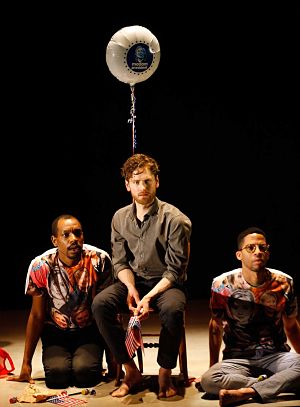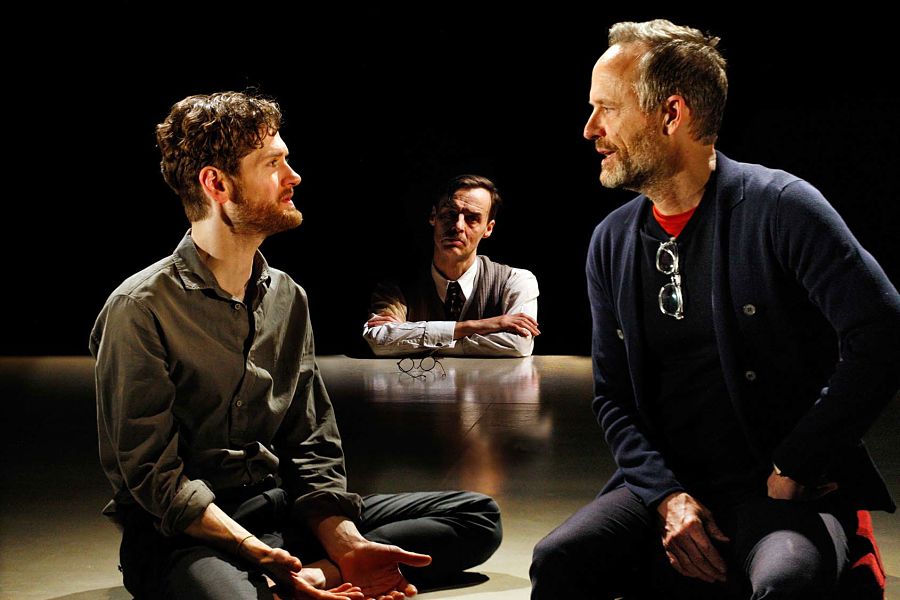Seeing American work in London can give me cultural jetlag. I recently watched London audiences heartily cheer for King George III in Hamilton (played with psychopathic glee and a good dose of ham by Michael Jibson), but also confusingly celebrate the British defeat at the Battle of Yorktown. It’s a privilege to witness the differences in these theatrical reactions—to see how work which moves across the Atlantic cities can ring true on both shores, yet resonate in each place with a slightly different tone.
Watching the revival of Angels in America in London last year, for instance, I was reminded how central the character of New York City is to the play. And while it was rapturously received in the U.K., I felt that a deeper well of emotions was lacking from the crowd’s response. Sure, jokes about pink British people got heartier laughs there than the line about Ed Koch. But when the show later moved to Broadway, the New York-ness of the play felt a little more present in the audience energy. We laughed together at some reflection of our American character too.
We take our history, experiences, and cultural identity to the theatre with us. So with another play about New York, AIDS, gay men, and gay history premiering in London—The Inheritance by American playwright Matthew Lopez— I found myself contemplating the distinctions between these two theatre cities again.
Commissioned by Hartford Stage, Lopez’s two-part, six-and-a-half-hour play premiered at the Young Vic Theatre in London (with a transfer to the West End announced for the fall) with a cast of American and British actors. Because of the format and subject matter, it was natural that comparisons might be made to Tony Kushner’s Angels. But that’s like a bit saying Hamlet and Fun Home (now on its way to London) are similar because (spoiler) there are dead dads in both.
The Inheritance is a sweeping, sentimental, romantic epic, but it’s more earthly and localized than Angels. It leads from the heart and operates like an accomplished cousin to a play like Terrence McNally’s Love! Valour! Compassion!, in which relationships between a group of gay men are at the center and cross-generational issues are explored. It also has a more mixed cultural heritage: Lopez’s inspirational source is British author E. M. Forster, and in particular the plot and quintessence of the novel Howards End. Lopez transposes the novel’s look at love, marriage, class, and generational conflict to a coterie of gay men in New York from 2015 to 2022.
The play traces the intersection of two couples. On the cusp of life changes are thirtysomethings Eric Glass (Kyle Soller) and Toby Darling (Andrew Burnap), who get by financially thanks to Eric’s inherited rent-controlled apartment; more settled are wealthy real estate developer Henry Wilcox (John Benjamin Hickey) and his longtime partner Walter (Paul Hilton), who have been together for 36 years. A catalytic figure, young actor Adam (Samuel H. Levine), enters Eric and Toby’s orbit and life begins to spin-off its axis for all of them.
At the same time, Eric and Walter strike up a friendship, and with it comes the revelation of Walter’s love of a house in the country where Walter cared for friends and strangers who were dying of AIDS in the 1980s. Something about Walter and this house touches Eric, who has a similar attachment to his grandmother’s apartment, where he lives now and where his family has been for generations. As in the Forster story, spiritual connections to homes, ghosts, desire, loss, charity, heartbreak, and politics all get tucked into these men’s lives in the 21st century with remarkable ease—even if Forster and his novel of manners, repression, and strict social expectations could not have anticipated sex parties on Fire Island, barebacking in the PEP/PrEP era, gay marriage, and the cultural appropriation of Yas Queen.
Where Lopez’s play is most effective is in opening the door to a deep conversation about intergenerational gay male friendships and relationships, a consideration of their shared struggles, and a contemplation of young men today, who are fighting for different freedoms and having different experiences than the men who came before them. The extent of the AIDS pandemic in the 1980s and ’90s may be a cleavage between these generations, but Lopez reminds us that AIDS has not gone away. In any case, maybe one shouldn’t need a plague for the gay community to unite around anymore.

Lopez also looks further back, to Forster’s era, when men could not love each other openly. By putting all these men on the same stage, Lopez creates a cultural and historic arc of the progress of gay life, of the pain each generation has borne, and reveals the kinship between these men, who find people to love, lose some of those men, and keep pushing forward anyway. Lopez sees it all as contiguous “family” history and in its expansive reach gives us a lot to chew over.
Still, it’s disappointing that even in a substantial two-part play the narrative still remains narrowly drawn around cisgender gay men when it’s purportedly addressing queer culture, community, and family. There are brief mentions of trans pioneers, and one woman appears onstage, but it is decidedly a cameo. The play addresses race only in a few select moments involving supporting characters. And frustratingly, most of the actors in the London production conform to a thin, chiseled beauty aesthetic (a line about one of them being ugly is entirely laughable, considering the blindingly handsome actor in front of us). This may be an accurate portrait of some social circles, but it’s a narrow lens on queer culture. As much as I can understand Lopez’s pointed focus and enjoy the warm affinity of these men as they see echoes of themselves flicker through time, it’s hard to not also miss who is absent here—i.e., those who frequently get written out of queer history, generation after generation.
While no transfer to New York has yet been announced, it seems a likely next step . References to BAM Next Wave, the disrupted Julius Caesar at Shakespeare in the Park, a shopping spree in the Strand Bookstore, and a lot of hullabaloo around a rent-controlled, 3-bedroom/2-bath on the Upper West Side would all play with much more humor and recognition in New York than in London. When the precise rent on the aforemementioned rent-control unit is cited, New York audiences might clasp their proverbial (or literal) pearls.
Stephen Daldry’s production is minimalist and chilly at times. In a heightened literary style, characters narrate events as a novel that is being written as we watch; other some scenes are played straight. A chorus of young men sit around the raised stone platform of the stage to observe, pass along props, or serve as characters in some scenes, which gives the proceedings a heavily ceremonial air (perhaps too heavy). A few abstract interpretive-dance sex scenes decidedly fail, and not all the performances are equally strong. For one, while the class issues and self-loathing of the Toby character might be really powerful, Burnap does not let us see much beyond his narcissistic outer shell, which can throw the play off-balance when the Toby storyline takes over. Hickey, on the other hand, reveals so much depth and pain in his unspoken moments, I could have watched him simply stand there for hours. Soller is the firm, emotional core to the production and keeps us invested from scene to scene. And Levine shows remarkable range in two very different roles, demonstrating boundless charisma in one and a whisper-thin sense of self in the other.
Despite some overly sentimental segments (bordering on maudlin) and broad narrative brushstrokes, it’s hard not to get pulled into the compulsive sweep of The Inheritance and to care about some of these characters. Repetitive motifs and mirroring of events refer to Howards End (E.M. Forster is even a character), and it’s impressive how natural Lopez makes these homages feel.
Perhaps most importantly, you can’t watch this play without reflecting on yourself. As a Gen-Xer, I found myself considering my own cross-generational relationships: I felt grateful for older gay men in my life who have mentored and befriended me, as well as enjoying the bubbly embrace of a younger generation of gay men who have been out since high school and who’ve enthusiastically welcomed a salty broad like me into their world. The play also made me confront my own tendency toward generational reproach. (Did I look upon some of the characters’ youthful frivolity at first with some irritation? Maybe.) But I appreciated that Lopez was writing without judgment, delving into unapologetic sexual freedom as well as the cost of that freedom, youthful hubris, codependency, fracturing friendships, self-sacrifice, selflessness, economic anxiety, political tensions, and the need for family in whatever form we make it.
That’s a lot to cover in six-plus hours, but this is the kind of play that lends itself to ongoing conversations when the lights come back up again, no matter your age or what city you are in.


